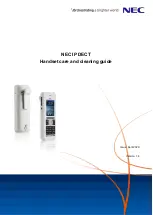
Handset care and cleaning guide
Page
5
© NEC Enterprise Solutions 2020
Liquid disinfection solution 4)
M166
G266
G566 /
G566s
G277
G577 /
G577H
I755
I766 /
I766Ex
3% Hydrochloric Acid
Occasional cleaning (weekly)
X
X
X
X
X
X
X
3% Hydrochloric Acid
Daily cleaning (5 times/day)
5)
X
X
X
60% Chlorhexidin 0.5mg/ml
Occasional cleaning (weekly)
X
X
X
X
X
X
X
60% Chlorhexidin 0.5mg/ml
Daily cleaning (5 times/day)
5)
X
X
X
4) The M166, G577, G577H and I766(/Ex) handsets can be cleaned with agents commonly used in
healthcare institutes. NEC refers to ISO 2812-4:2017 (en) - Paints and varnishes
– Determination of
resistance to liquids - Part 4: Spotting methods
5) Frequent and intensive cleaning may lead to excessive wear of the handsets for which NEC cannot
take responsibility
Note; even though devices are resistant against the solutions as specified in above table, they may
absorb substances such as from cosmetics and food during use. These substances may have a
surface-softening effect that will make it more sensitive to abrasion with cleaning fluids resulting in
damage to e.g. the keyboard
2.3
Cleaning wipes
Only use cleaning wipes containing fluids as mentioned in chapter 2.2. Some wipes may contain different fluids
and/or a concentration which may damage parts, such as the lens and keyboard.
Make sure that you also follow the manufacturer guidelines for these wipes, as they mostly offer variants of
these wipes for general cleaning as well as for cleaning of delicate equipment such as mobile phones.
2.4
G577h Anti-bacterial DECT handset
The G577h has been designed for healthcare. Special substances have been added to all parts of the handset
that may touch the skin, such as plastics, lens and rubber parts. This minimises the risk of bacterial infections.
The following substances are applied to various handset parts:
Handset main body (soft): DSM, TPEE L-X07805
Handset main body (hard): ZEOMIC DAW502
Keypad: ADMIRE ADM-BF
Lens coating: Admire ADM-BJ01
Belt Clip Silicone: ST1007
The placing of the keys allows for easy cleaning of the keypad surface.
























